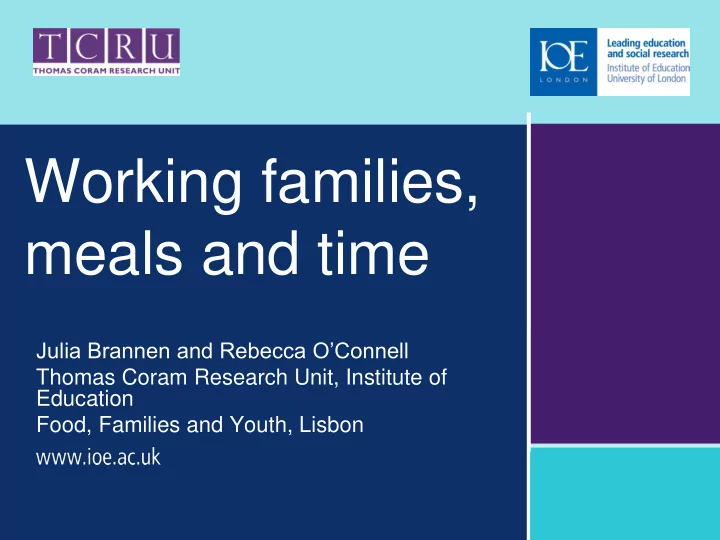

Working families, meals and time Julia Brannen and Rebecca O’Connell Thomas Coram Research Unit, Institute of Education Food, Families and Youth, Lisbon
Why focus on family meals? •Symbol of family; ‘doing family’ and displaying family • Family meals are indicators of eating healthily - associated with wider health and behavioural outcomes • Mechanism for transmission of culture • Mechanism for the socialization of children (e.g. language and etiquette) 2
Family meals in decline? Popular perception of family meals in decline The family meal has a normative status reflecting the ideal more than the real (Murcott, 1997, 2010; Jackson et al., 2009; Wilk, 2010) Research Q: Do working families eat together and under what conditions? 3
‘Time poverty’ and theories relating to time Speeding up of time/ extended present Harried pace of life Intensification of work/ long/ irregular working hours Work/ family spill over Intensification of parenting 4
Families, food and work project Longitudinal qualitative study linked to secondary analysis of a national UK survey NDNS Qualitative sample drawn from NDNS (England) Wave 1 N=47; Wave 2 N=36 Children aged 2-10 at Wave 1; aged 4-14 at Wave 2 Qual analysis compared with secondary quant survey analysis Children participated as well as parents Mix of methods / activities for children 5
Parents’ views of the importance of family meals I grew up having family meals and I’ll always sit at the table and eat.’ (Lone mother, children aged 11 and 9 at Wave 2) ‘Well I think it [family meals] is a time we can all get together and sit round and discuss what we’ve done in the day.’ (Mother, children aged 7 and 3 Wave 1) ‘… [eating together] really good for their language development. It can be a bit of a strain…’ (Mother with children aged 3 and 2 Wave 1) 6
Who makes meals in the working week? Mothers did most of the cooking on weekdays and weekends at W1 and W2 One third of fathers cooked one or more meals on weekdays W1 and W2; the rest cooked on high days and holidays or did other forms of food work Fathers’ contributions decreased W1 to W2 Fathers more often did food work on weekdays when mothers and fathers both worked full time 7
W1: Mothers’ working hours by meal patterns 18 16 14 M not working 12 M short PT 10 M long PT 8 M FT 6 4 2 0 Eat together most days Eat together some days or Never eat together W1 W1 with one parent W1 8
W2: mothers’ working hours by meal pattern 25 20 M not working 15 M short PT M long PT 10 M FT 5 0 Eat together most days W2 Eat together some days or Never eat together W2 with one parent W2 9
Time poverty reconceptualised Increased simultaneity whereby individuals occupy different social domains concurrently (Brose, 2004) severing the time - space link (Harvey, 1990) NOT the shortage of time BUT the issue of timing (Warde, 1999) Lack of ‘synchronicity’ or coordination of time schedules ( Southerton, 2001) and time paths 10
So what affected whether families ate together? Not mothers’ or fathers’ working hours BUT Synchronisation of parents’ work timetables Synchronisation of children’s lives Body tempos of children Tastes and food preferences of children and other family members 11
A ‘proper dinner’ at the table; An unsustainable goal James aged 11 at W1 � 12
Quasi or modified family meals Families do not eat together every day because of Dads arriving home from work late The timing of children’s ‘extra’ activities Childcare eating regimes The need for young children to eat early Children eat with one parent on different days where parents live apart 13
Dad arriving home late; continuity of the modified family meal Malkeet aged 6 at W1 14
No family meals Two patterns Individualised meals Collectivised meals 15
Individualised meals Hayley aged 11 W1 16
Conclusions • Working lives make eating together difficult to achieve and more difficult over time • Eating together depends on coordination of the time paths of parents and children; flexibility in both mothers’ and fathers’ work time, family size, the timing of children’s routines, body tempos especially those of young children • Eating together depends on the coordination of food tastes and preferences and the organisation of eating space in the home 17
Time for a rethink? ‘Families need time together, although what they do together changes as children grow up and the shape of this time changes. What parents of young children want might be very different to what parents of teenagers want... what many families report …is frequent disruption of time together and of activities.’ Report from Time health and the family 2014 18
Recommend
More recommend